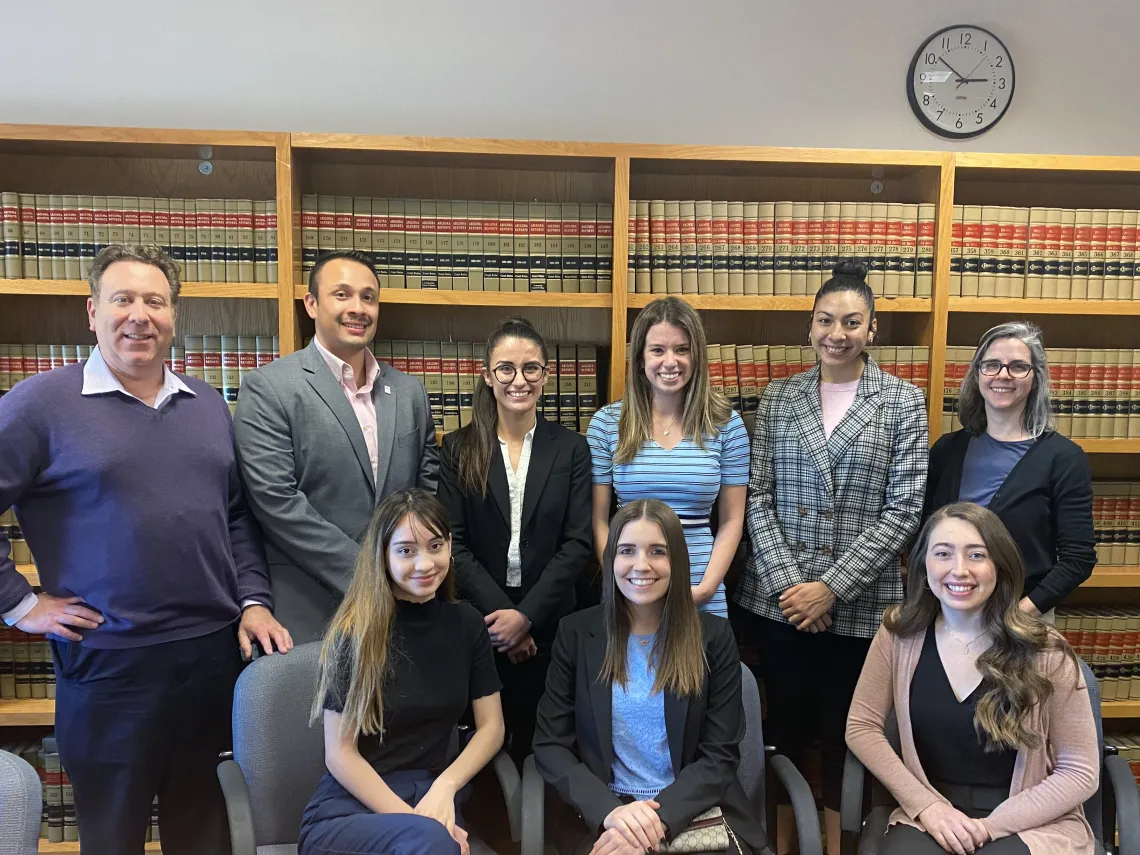At the University of Arizona, Nation’s First Law School Clinic for Undergrads Gives Students Legal Experience while Serving the Community
“This is a leap forward in experiential legal education for undergraduate students”

With 16 clinics in operation, practical training has long been a key component of the JD program at the University of Arizona James E. Rogers College of Law. Now, University of Arizona undergraduate students majoring in law have a similar opportunity to gain real-world experience and prepare for careers in the law, with the law school’s new Juvenile Justice Undergraduate Clinic. The clinic, open to students enrolled in the university’s bachelor of arts in law program, is the first in the nation exclusively designed for undergraduate students within a law school.
“This is a leap forward in experiential legal education for undergraduate students,” says Assistant Clinical Professor of Law Diana Newmark, who helped create and now directs the clinic. “University of Arizona Law is the only law school that has created this opportunity for undergraduate students. In the clinic, our BA in Law students gain real-world legal skills, help members of the community who need assistance, and build relationships with local courts and legal service providers.”
The BA in Law program is the nation’s first undergraduate law degree and is a partnership between Arizona’s James E. Rogers College of Law and the School of Government and Public Policy.
The project-based clinic launched this semester and connects BA in Law students with community partners serving local youth, including the Pima County Public Defender, Tucson Metro Goodwill, FosterEd and the Pima County Juvenile Court.
The clinic gives BA in Law students experience providing crucial services that do not require the assistance of a licensed attorney. Clinic student responsibilities include work such as helping research and draft applications for record destruction with the Pima County Public Defender, researching and drafting “Know Your Rights” materials about school discipline laws, and working with the Pima County Juvenile Court to assist members of the public in the resource center.
“There is a huge unmet need for legal services in many areas of the law, and for some tasks, the work of a licensed attorney is not needed,” says Newmark. “This means that there is a lot of important, impactful work that BA in Law students and graduates can do without a JD degree. The clinic is a way to explore these paths and contribute to developing the type of services that they can provide.”
Linus Kafka, assistant director for careers and outreach for the BA in Law program and a professor of practice, created the clinic with Newmark and says law majors who participate in the Juvenile Justice Undergraduate Clinic have the chance to make themselves more competitive in the job market by building their skill set and professional network.
“They gain legal interviewing skills, assist on projects with real legal problems, establish connections with community organizations, lawyers, and judges, and learn to understand the daily operations of a law office,” Kafka says. “As Arizona and other states look at expanding the ability of non-lawyers to provide certain legal services, BA in Law students will be positioned better than anyone to meet that demand.”
BA in Law junior and clinic student Kayla Trafford plans to apply to law school and says the clinic is helping her get a head start on deciding what type of law she wants to study. She also finds the hands-on experience in the legal field unique, since it is typically reserved for JD students.
“For this clinic to be provided for undergrads is really helpful as we try to get into the legal field and figure out what we want to do,” says Trafford.
The clinic also includes a seminar portion that teaches students about topics in juvenile law, such as due process rights for children in juvenile delinquency cases, child welfare and foster care, and student education rights. They also study professional ethics and practice skills used in legal environments, such as interviewing.
“This opportunity helps students go beyond the experiences they might have in an internship, by building their understanding of substantive and larger-scale issues,” says Newmark.
Students enrolled in the Juvenile Justice Undergraduate Clinic this semester are also learning skills that weren’t listed on the original syllabus: how to adapt in the midst of a global crisis and rethinking the delivery of legal services during social distancing.
When the COVID-19 pandemic forced the university to transition to online classes in mid-March, clinic students continued to work on their existing projects from home, while also developing ways to meet new challenges caused by COVID-19. Students began working to determine how prisoners can appear telephonically for Juvenile Court proceedings to ensure access to justice continues while social distancing orders are in place. They have also been redesigning standard court forms into fillable PDFs, a critically important need while access to office supplies like printers and scanners is particularly limited.
“The clinic students have responded to this ongoing crisis with creativity and dedication, developing new projects and modifying their work to meet increasing demands,” says Newmark.
The Juvenile Justice Undergraduate Clinic runs each fall and spring semester and is open to University of Arizona students in the BA in Law program.
